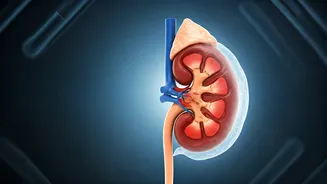Protein Myth Unveiled
The widespread concern in India regarding protein powders and their impact on kidney function has been addressed by an AIIMS neurosurgeon. Contrary to
popular belief, this expert has pointed out that the fear of protein powders is more detrimental than the consumption of sugar or carbohydrates. This insight shifts the focus from avoiding protein to understanding its importance in a balanced diet. The expert's statement is particularly relevant in India, where misconceptions about health and nutrition are prevalent. This revelation aims to dispel myths and encourages a more informed approach towards dietary choices. This could lead to a better understanding of how to support kidney health while also ensuring an adequate protein intake, essential for overall well-being.
Kidneys, Protein, & Health
The primary concern associated with protein intake and kidney health is whether protein powders can damage the kidneys. The neurosurgeon's perspective helps clarify this important point. The expert's insights are particularly valuable because they provide evidence-based information, challenging the common narrative that links protein intake directly to kidney damage. The conversation surrounding protein and kidney health often overlooks the context of a person’s overall health and diet. The expert's insights emphasize that, within a balanced diet and regular exercise, the protein powders aren't harmful to kidneys. It's the overall nutritional intake, in conjunction with lifestyle, that plays a more significant role in determining the health of one's kidneys. These observations are especially relevant in a society where information on nutrition is often contradictory and overwhelming.
Carbs, Sugar, & Concerns
The neurosurgeon's point about the potential harm caused by the avoidance of protein being greater than that of sugar or carbs underscores the importance of a balanced dietary approach. The excessive consumption of sugar and refined carbs is often linked to various health issues, including increased risk of diabetes and heart disease. When people actively avoid protein, they might be missing out on essential nutrients that support muscle function, cell repair, and other vital bodily processes. The expert highlights the need for balanced food intake, where the focus is not only on what to avoid but also on what essential nutrients the body requires. This nuanced perspective encourages a thoughtful approach to nutrition rather than resorting to overly restrictive diets. By giving an overview of the topic, it invites people to rethink their food choices by emphasizing the importance of considering the entire nutritional profile.
Protein's Role in Body
Protein is fundamental to nearly every function within the body, including the structure, function, and regulation of body tissues and organs. From the structure of skin, hair, and nails to the essential roles in enzymes and hormones, proteins play a crucial role. Protein is also an essential component for the immune system, by building antibodies that protect the body against illness. Adequate protein intake is vital for maintaining muscle mass. The body uses amino acids from protein to repair and build muscle, particularly after physical activity. It promotes satiety, which can help in managing weight as it can lead to feeling fuller for longer, which reduces the propensity to overeat. Thus, protein plays an important role in overall health, and its significance goes far beyond its role in building muscles.
Making Informed Choices
To make informed dietary choices, one should understand their individual health requirements. Consult with healthcare professionals like doctors and nutritionists who can provide personalized advice based on individual needs and health conditions. Understanding the sources of protein and their nutritional benefits is crucial. Protein can be obtained from various sources, including lean meats, poultry, fish, eggs, dairy products, and plant-based options like legumes, tofu, and nuts. Considering the source, along with the nutritional profile, can help make dietary choices. Always read food labels to check the protein content and other nutritional information. Being aware of these can help people make informed choices, and manage their health well.














